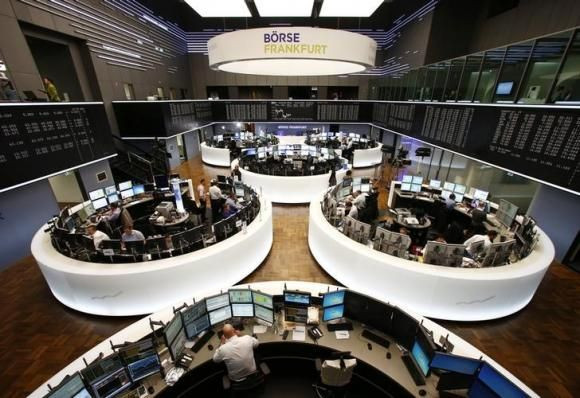European Shares At Fresh Seven-Year High As ECB QE Nears

(Reuters) - European shares rose to fresh seven-year highs on Friday, extending a two-month rally fueled by the European Central Bank's money printing program which starts in the coming weeks.
European shares bucked a softer trend in Asian and U.S. markets as a sharp overnight pullback in crude oil prices dampened risk appetite there. Brent crude was up 1.24 percent by 0420 ET on Friday.
The FTSEurofirst 300 index of top European shares was up 0.3 percent at 1,561.60 points, with strong annual results from Airbus Group, the world's second-largest aerospace company, spurring the rally.
About two-thirds of the way into Europe's earnings season, 55 percent of companies have met or beaten profit forecasts. Overall, fourth-quarter earnings are expected to grow by 19.5 percent, according to Thomson Reuters I/B/E/S, which would be Europe's best season in 3-1/2 years. "The rally in stocks is so strong that we could see a capitulation of the shorts at some point, which would push the market even higher. Clearly some indexes have reached frothy valuation levels, but we're still long in the short term," said Mirabaud Securities senior equity sales trader John Plassard in Geneva.
The FTSEurofirst 300 index is up 14 percent so far this year as the prospect of the ECB's quantitative easing program drove core European bond yields into or close to negative territory pushing investors into higher-yielding assets such as equities.
Euro zone inflation data for February due at 1300 is expected to underline the ECB's Jan. 22 decision to embark on a 60 billion euro monthly securities buying program to fend off deflation and revive the euro zone economy.
European government bond yields held near record lows before the data expected to show consumer prices fell 0.5 percent in February.
"Stimulus seems to be working a treat for some of the key markets around the world, including Japan and the euro zone. Recent data out of Europe has also been showing some positive signs and this has really encouraged investors to drive equities higher," Stan Shamu, market strategist at IG in Melbourne.
Asian equities mostly retreated from multi-year highs after falls on Wall Street overnight, with the MSCI's broadest index of Asia-Pacific shares outside Japan down 0.1 percent after advancing to a five-month high on Wednesday.
Strong factory output data and a weaker yen pushed Tokyo's Nikkei .N225 to a fresh 15-year high but the market was last flat as profit taking kicked in.
U.S. HEALTH CHECK
The dollar index slipped, pegged back by month-end selling, but was still on track for its eighth straight month of gains on better data and comments from Federal Reserve officials that bolstered bets for a rate rise this year.
The index, which measures the dollar's performance against major currencies, was set to mark its longest streak of monthly gains since the greenback was floated as a fiat currency in 1971.
"It is the data, especially core inflation and durable goods, that is catching attention. We are still calling for a June rate hike and the market is not pricing that. (The markets) are looking for a hike much later. So yes, we think the dollar will outperform," said Hamish Pepper, strategist at Barclays.
The dollar eased 0.1 percent against the yen to 119.30 yen, but remained above Thursday's low of 118.68 yen.
Investors are now waiting for revised fourth quarter U.S. gross domestic product data due later on Friday for another health check of the world's largest economy.
Economists polled by Reuters expected U.S. growth in the fourth quarter to be revised down to 2.1 percent from a preliminary 2.6 percent.
The slip in the dollar helped the euro to edge up 0.15 percent to $1.1215, but still near the one-month low of $1.1184 plumbed overnight.
© Copyright IBTimes 2024. All rights reserved.




















